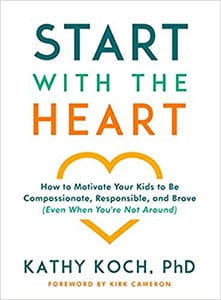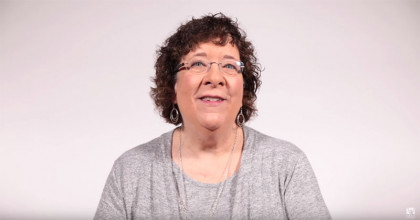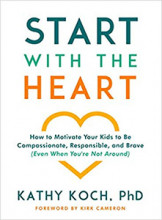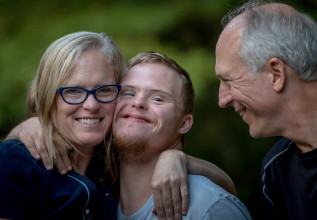
The War of Words
In this Adventures in Odyssey drama, a carelessly uttered word from Eugene creates havoc as it becomes the fashionable insult, resulting in a lesson about the power of words.
Home » Episodes » Focus on the Family Broadcast » Motivating Kids to Reflect the Character of God (Part 2 of 2)
In this Best of 2019 broadcast, Dr. Kathy Koch offers practical advice for how you can teach your children positive character traits and strengthen your relationship with them in the process. (Part 2 of 2)
Dr. Kathy Koch: If you look at the data, whether it be politicians, judges, educators, radio personalities – I don’t know what your backgrounds are. But it’s – A students don’t necessarily change the world. Resilient people change the world.
John Fuller: Dr. Kathy Koch. And she’s with us again today on this Best of 2019 Focus on the Family. Your host is Focus president and author, Jim Daly.
Jim Daly: John, I am so pleased to have Dr. Kathy Koch – Dr. Kathy, as we call her – back with us. Her insights are so solid. And we hear from you when we have Dr. Kathy on because she is touching those tender areas of parenting. And that’s one of the things at Focus we want to do, is to help you. And by the way, it helps all of us with kids still in the home to be better parents. That’s what this is about. And I’m grateful that you’re leaning in and wanting to hear more to help you in that journey.
Last time, Dr. Kathy talked about godly character qualities, those things we need to instill in our children that we’re desperate to. And then a good place to start biblically there is Galatians 5:22 and 23, the fruit of the spirit. We mentioned that last time – love, joy, peace, patience, kindness, goodness, faithfulness, gentleness, and self-control. And the only way we can really help our kids grasp these character qualities is by having a solid relationship with the Lord ourselves, and then with our children. And modeling these qualities and admitting when we’re wrong. I think that is so good. I try to do that. When I’m out of line, I tell my kids, “I’m sorry. I blew it there.” It’s probably the biggest smile I ever see on their face…
(LAUGHTER)
Jim: …Is like, “Dad blows it, wow.” But if you missed any part of the program last time, let me encourage you to listen to the app or contact us. We’ll get you the CD or the download, whatever you need to do. ‘Cause it was very effective help for parents who are struggling.
John: Yeah. We also mentioned our 7 Traits Of Effective Parenting Assessment. That’s free. You can find the book, the CD download, all the help you need at focusonthefamily.com/broadcast, or call 800, the letter A and the word FAMILY, and we’ll tell you more.
And Dr. Kathy Koch is the founder and president of Celebrate Kids, Inc., and co-founder of Ignite the Family, a movement of awakened parents. She’s also the author of several books, including one we’ll really talk about today, Start With The Heart: How To Motivate Your Kids To Be Compassionate Responsible And Brave (Even When You’re Not Around).
Jim: Whenever I hear the title, I’m like, “Sign me up. Why wouldn’t I read this book?” I mean, that is the title. That’s what we’re striving for as parents, is to do exactly that. Welcome back, Kathy.
Kathy: Thank you. It’s a joy to be here.
Jim: It’s good to have you.
Kathy: Thank you.
Jim: Man, I just always want to rush right into the questions with you because you’re so full wisdom in this regard.
Kathy: Oh, thanks.
Jim: And you’ve done this. You have a Ph.D. in educational psychology. It was Purdue, right?
Kathy: Right.
Jim: Oh, man, that is amazing. But what you’ve learned, how you’ve applied it – just to give that perspective to the listeners, you’ve interviewed and spent time with literally hundreds and thousands of kids and their parents…
Kathy: And their parents, right.
Jim: …Trying to figure out and diagnose what’s going on. So, you’ve seen it. And you’ve done it. You’re a practitioner. And that’s what makes this so helpful. We left off last time about to talk about the five core needs. So, let’s run through those. That’s a good place to kick off today. What are the five core needs?
Kathy: Right. Security – who can I trust?
Jim: This is for the child.
Kathy: For the child.
Jim: Okay, that’s good. Security. Who can I trust?
Kathy: Right.
Jim: And then we moved to identity.
Kathy: Identity – who am I? And then we get to belonging; who wants me? Do they want to be wanted by you? Do they want to spend time with you?
Jim: So, Dr. Kathy, that’s security, identity, belonging. What’s the fourth one?
Kathy: Purpose – why am I alive?
Jim: Mm!
Kathy: And kids who don’t know why they exist don’t need to be good at anything. And so rather than stickers and rewards and the threat of a negative consequence, sometimes it’s just, you know, “Why are you alive today, you know, Samantha? What’s – what do you think your purpose is?” And if you can help kids plug into why they were created for such a time as this, they can now discover that algebra matters or obedience matters or a clean room matters.
Jim: Right. That is – that’s good stuff. And then the fifth one…
Kathy: Competence – what do I do well? – which comes right from purpose. If I don’t have a purpose, I don’t need to do well at anything. So again, kids who you know are capable of more and aren’t showing you more – whether that’s academics or attitudes or character or obedience in the home and chores – sometimes, the lack of competence is a lack of purpose, a lack of belonging, a change in identity and a lack of security.
Jim: Wow.
Kathy: And it’s not necessarily study more. It’s going back down that pyramid, if you will, and figuring out where the disconnect is.
Jim: Well, those are good. And, of course, you’ve covered that in other broadcasts that we’ve had, these five core needs. But let’s move now to that parenting aspect you were mentioning. And I think this is great, too. In this new book you have, Start With The Heart, you talk about four distinct roles that parents have. What are they?
Kathy: Yeah. This is fun. We have to be teachers. Even if we don’t get paid for it. OK.
(LAUGHTER)
Kathy: We’ve got to be teachers.
Jim: We definitely won’t get paid for it.
Kathy: No. But you know what, guys? We have to explain and demonstrate and use vivid language and teach. You know, telling the kid to make a bed is different from teaching a kid how to make it…
Jim: Mm.
Kathy: …Seriously.
John: Yeah.
Kathy: And when you say to a child, “Clean your room,” the kid is like, “Whoa. There’s toys and clothes and a bed and a dresser top and the windowsill. And there’s the bottom of the closet and the top of the closet. And she said I had to clean my room.”
Jim: That’s good.
Kathy: Now how do I do that? So, have I taught them to be successful? All right.
And then to be a coach. I’m a former coach. I used to break – a coach breaks a complex task into, uh, minute details. As an example, as a basketball coach, I never let my girls run and dribble until they could dribble standing still.
Jim: Huh? Right.
Kathy: And I never let them be defended or have somebody try to steal the ball until they had learned to dribble and run pretty well successfully, right? I never let a girl do left-handed lay-ups who couldn’t do right-handed lay-ups if she was right-handed. A coach or a music teacher tends to divide a complex task into, um, separate skills and practice those skills in isolation and then put it all together in the big picture. Let’s be a coach. You want your kid to write an essay? Oh, my goodness. There’s word choice, spelling, sentence structure, paragraph breaks, content. There’s an introduction. There’s a conclusion. To say, “Write your essay” – no. Coach them in how to write it. Coach them in how to sweep out the garage. Sometimes, you guys – they have such a heart to be successful. And they’re not able to be because we have not played the role that would be a blessing to them.
Jim: Yeah.
Kathy: And I say that with great respect for the parents who are really trying to do the very best they can.
And then the third role is to be a cheerleader. And the most important thing about being a cheerleader is to change the cheer when you must. So, if your team is down – like, I’m a Green Bay Packer fan. I probably just lost an audience. But…
Jim: Uh oh.
John: (Laughter).
Kathy: I’m a Green Bay Packer fan – used live there. So, the Packers are playing the Bears, and the cheerleaders are there. And everybody’s cheering. But when the Bears are down by 31 points at the beginning of the fourth quarter, the Bears cheerleaders are no longer cheering V-I-C-T-O-R-Y. They’re still there. And they’re still smiling. And they’re still building a pyramid. But they’ve changed the cheer.
You have to change the cheer. You have got to stop saying to your child, “You can do it” if you have no evidence they can…
Jim: Huh.
Kathy: …Because that robs the child of any hope. In the heart of the parent is that they would succeed. But you guys, it’s not about your need for them to succeed. It’s about, who are your children? Change the cheer.
Jim: Hmm. That is well said.
Kathy: Thank you. I have tears in my eyes because what children have told me is, “Dr. Kathy, he said I’d have a great year in math again. Does he not understand math is really hard?”
Jim: Yes.
Kathy: “Will my daddy – will he ever love me…”
Jim: Mm.
Kathy: “…Even if I come home with a C?”
Jim: Mm.
Kathy: Jim, I’ve had – you know, I’m tall. I’m 6’1″. I’ve had young people say to me, “Dr. Kathy, did your parents ever ask you to be short?”
Jim: Wow.
Kathy: I’m like, “Well, that’s – no. They would never ask me to be short. They knew I’d be tall.” And I’ve had kids say, “Well, my parents want me to, like, earn an A. And I think I’m a permanent C like you’re permanently tall.”
Jim: Wow. How do you answer that question?
Kathy: I ache with them. I hug them. I always respond emotion with emotion. “I am so sad. And I’m so sorry. Your parents want the best for you. Help them understand you are working your very best…”
Jim: Yeah.
Kathy: …So to try to empower the child to speak up bravely when possible.
Jim: So, hit those three again.
Kathy: Yeah.
Jim: And what’s the fourth?
Kathy: So, to be a teacher, to be a coach and to be a cheerleader. Um, no great team will win with just a cheerleader.
Jim: Yeah, right (laughter).
Kathy: Some parents are only cheerleaders. “Fabulous – you’ve done great.” And they’ve got to back up and teach. And the fourth one is be a referee.
Jim: Oh, man (laughter).
Kathy: Shoot. Blow the whistle.
Jim: That’s a fun job.
Kathy: No, it’s not, you know? But be a parent.
Jim: (Laughter) That’s not is my point.
Kathy: Yeah. You know, be the parent. And blow the whistle. And call sin sin. “You’re out of bounds.” “Keep your hands to yourself.” But here’s the thing, guys. And you know this. You’ve parented a long time. When we teach, coach and cheer well, we won’t have to ref as often.
Jim: Mm.
Kathy: And a parent is reffing (ph) all the time, nagging all the time, yelling all the time, back it up and see what role you could play instead so that you don’t wear the ref-nag role because that’s what’s damaging the relationship. And now they don’t want to listen to you.
John: Mm. Dr. Kathy Koch is our guest again today on Focus on the Family with Jim Daly. I’m John Fuller. And her book is Start With The Heart: How To Motivate Your Kids To Be Compassionate, Responsible And Brave Even When You’re Not Around. And we’ve got this great book and additional help. Now the CD or a download of this conversation will have extra exclusive content. And you can find the book and the download or CD at focusonthefamily.com/broadcast.
And you know, Kathy, even as you’re going through those four roles I’m thinking about the child that seems to be kind of unresponsive to any of that. They’re not listening to the coach or the cheerleader, the ref. They’ve just checked out. So, what’s going on there? And how do we deal with that?
Kathy: Wow. If you make a radical change in your parenting because of this broadcast, the kids are going to freak out and wonder, “What happened to mom?”
(LAUGHTER)
Kathy: So sometimes, kids aren’t able to, um, connect because we’ve made such a change. The kids will say, “You know, what book did you read?” – you know?
Jim: “What program did you listen to?”
Kathy: “What program did you listen to, you know?”
Jim: Right. I’ve heard that before, actually.
Kathy: And I think that’s great. So sometimes…
Jim: (Laughter).
Kathy: …You know, if you do something brand-new…
John: Yeah.
Kathy: …You know, maybe even explain it if the kids are old enough and say, “Yeah. I listened to Focus on the Family and this gal had a really good idea. I think I’ve been roughing way too much. And I need to back out and be a – or maybe I need to change the cheer or, you know, whatever the case…”
Jim: Be more of a coach.
Kathy: Right – be more of a coach. So, I think own that. And also, the smile on my face when you were making that statement John was because no kid has ever really checked out.
John: Well, that’s why I said “seems.”
Kathy: “Seems” – yeah. They’re wondering – I think they’re looking for our integrity. I think they’re looking – “Are we going to be consistent?” I think they’re looking at “Do you really mean it?” Like if Dad says, “You know, I need to change the cheer. You have demonstrated to me that this is your excellence, and I need to own that.”
Jim: Yeah.
Kathy: “This – your B is your A. And I am proud of you for earning the B because it could have been a C. And I understand that you’ve been a diligent, persevering worker – proud of you. And I apologize that I’ve not seen that before. But I am committed to honoring who you’ve been created to be. And I’m going to call your B and A.” That kid is going to watch to see if you really meant it.
John: Mm.
Kathy: And now dad has to change a habit. Dad has to change a pattern.
John: Now it’s me. Yeah.
Kathy: Dad has to make some decisions.
Jim: Kathy, discipline is an issue. I mean, you’ve got to think about that as an aspect of rearing a child. Now, you know, there’s lots of behavioral scientists out there who have a variety of things to say about disciplining your kids. But you suggest using consequences instead of rewards and punishments.
Kathy: Mmm hmm. Mmm hmm.
Jim: And this is big because, you know, these are the tools young parents particularly start to read about and learn about when their children are 2, 3 years old, you know, punishment, reward. What’s your approach there?
Kathy: Mmm hmm. I like the word consequence because a consequence is something you earn. A reward and punishment is something you get. So, you can only be rewarded and punished when someone is there observing you and chooses to engage with you. Consequences are always in place.
Jim: Mmm hmm.
Kathy: You know, you stay up too late having a good time; consequence – you’re tired. Consequence is you don’t pay attention in class. Consequence is you earn a C. You come home. You forget that your dad said, “You know, it was your garbage night or sweep-out-the-garage night or wash-your-sister’s-bike…”
Jim: Are you speaking to me (laughter)?
Kathy: No, no, no – didn’t need to. So, I like consequence because it’s – it begins to establish the self-respect, self-responsibility, humility within a child. So again, the consequence for your choice…
Jim: Right.
Kathy: “You needed to clean your room so that you could have a friend over. You wanted to have a friend over tomorrow night. And our rule in our home is that your room has to be presentable for you to have a playmate over. You chose to forget that. Therefore, your friend can’t come over.” “No, no. I didn’t know…”
Jim: Yes. So, you connect all those dots.
Kathy: Mmm hmm.
Jim: Yeah. Yeah. I mean, that’s brilliant.
Kathy: Well…
Jim: It takes effort and thoughtfulness to do that.
John: And they’ll fight that.
Kathy: Yes. Yes. They will. They’ll come back. You know, “No, I didn’t mean to.” “No, you meant – no. It doesn’t matter if you didn’t mean to. The point is that you didn’t.”
Jim: The evidence is there.
Kathy: “And our policy is – and, therefore, there’s no playmate tomorrow night. If you would like a playmate over maybe on Saturday, you know, I’ll consider that. But what will you have to do? Clean your room so that it’s presentable.
And you actually agreed that that was a smart principle. Like, we don’t have people over for dinner when the living room and dining room is a chaotic mess. So, you agreed, as a child of ours, that this was a wise policy.”
Jim: Yeah.
Kathy: “So don’t be telling me it’s my problem.”
Jim: Well, and, you know, we’ve hit a lot with the older kids. And that’s probably because that’s where I’m living.
John: We’re living there. Yeah.
Kathy: Yeah.
Jim: But to aim at a little younger…
Kathy: Sure.
Jim: In the book, you use a great classic children’s story, The Little Engine That Could.
Kathy: Mm-hm.
Jim: I mean, all of us know that. “I think I can. I think I can.” Is that what it says? I can’t even remember.
Kathy: Yes. Yes. “I thought I could.”
Jim: (Laughter).
Kathy: Yeah.
Jim: So that’s a positive kind of model or tool to use with children. Speak to that approach.
Kathy: Sure. You know, for young kids, in particular, whether it’s cleaning the room or beginning to learn how to empty the dishwasher or take your plate from the table to the kitchen sink, do it with them. Do it for them and have them watch. Then do it with them. And then establish that they’re capable to do it on their own. And communicate that strength. “You know, Angela, we’ve been doing this together now. You are old enough, and I trust you to watch where you’re going and take care of this on your own.”
Jim: Yeah.
Kathy: “I’m so proud of you for learning and growing.” And so, it’s that concept of the training wheels, if you will.
Jim: Mmm hmm.
Kathy: And then – but you take the training wheels off eventually. And they get a bigger and bigger bike. So that analogy makes sense to anybody. Um, so I think communicating clearly there is really important.
You can still use the language of consequence and choice. I think that’s really powerful. Um, and it’s not that you don’t give rewards. It’s not that you don’t, quote, unquote, “punish.” But it’s the language that you use.
Even if you don’t verbalize the word consequence, you know in your heart I’m punishing because he chose not to do it. But it’s his consequence. I’m not a bad parent. I’m not a mean person.
Jim: Yeah.
Kathy: My child earned this, if you will, punishment.
Jim: One of the things you recommend in the book is, to know your child better, take a piece of paper, put it into fourths, and you ask four questions. And what are they? And you’re doing this really to get to know them better. I think it’s brilliant for parents to do this.
Kathy: Oh, thanks – and for you to do it as well so the kids can get to know you.
Jim: That’s good.
Kathy: And then you can find out if the family has anything in common.
Jim: And what are those four things?
Kathy: Yeah. Five things you want to be in your lifetime. So, in one of the boxes, write the word be. Five things I want to be in my lifetime. The next one is do – five…
Jim: Can I get – with each of these, give me an example of to be.
Kathy: Five things I want to be – I want to be kind. I want to be content. Like, it would be wonderful if they would mention character. Or I want to be a policeman. I want to be married.
Jim: So, kind of a vocational or state of life.
Kathy: It could be – what’s very interesting is if you do this and then you analyze it, is it all material, um, career, or is it character?
Jim: Interesting.
Kathy: Like, I know some kids who will write down they want to be a mom. But they don’t write down be married.
Jim: Right.
Kathy: So, it gives you a chance to have a conversation, which they stimulate. So, you’re not interrogating. And it’s not negative. It’s just this interesting conversation about the dreams that they have about their tomorrows.
Jim: OK. As we go through the others, I just want to ask how much coaching should a parent do with this?
Kathy: None.
Jim: Good.
Kathy: Yeah.
Jim: I just want to clarify that. I knew that was the answer. But I wasn’t (laughter)…
Kathy: Yeah. Ideally, we’re very quiet. They might even do it in their room and then come back and show us.
Jim: And so that’s the to be list.
Kathy: Mmm hmm.
Jim: And you want about five things from – in each category.
Kathy: Right. Right. And I usually say in your lifetime but, for younger kids, you know, before your birthday or before the end of the school year.
Jim: OK.
Kathy: You know, it’s up to you. The next one is five things you want to do. And I know of a mom who wanted to jump out of an airplane. And her husband got that for her birthday…
Jim: Because they did this?
Kathy: …Because they did this. And he…
Jim: Oh, that’s great.
Kathy: And he didn’t know that it was a dream that she had. You know, five things you want to do – I’ve had kids you know tell me that they wanted to mountain-climb or zip line or go to camp or go camping or…
Jim: So that’s more activity-based.
Kathy: Yeah. Something I can do – the third one is five things that I want to have.
Jim: Hmm.
Kathy: And this is interesting because, like, what would you want for your sons, Jim? Would you want them to say, “I want to have a healthy marriage.”?
John: Hm.
Kathy: “I want to have a meaningful career. I want to have a dynamic relationship with Jesus Christ”? Or do they say, “I want to have a Ferrari. You know, I want to have a bigger house than anyone else on the cul de sac”? Those are two examples that I’ve had from young people.
Jim: So, these give insights, really.
Kathy: They give great insights because the more that I know my kids, the more I can speak truth in ways that they can hear it. And the last one is five things I want to help, five causes or interests or people groups I want to help. Do I want to help the homeless, the hungry, the sex trafficking, um, the single moms? What do I want to help? And you can look to see, are there connections between any of this? And that now you have service projects. And when we serve as a family, we grow as a family.
Jim: Yeah.
Kathy: And kids listen to us more. So maybe you have a son who wants to help these people groups. And you find out a way in your community on a Saturday morning to do that. And now that kid’s going to feel heard and known and empowered by you to be successful.
Jim: And if you’re seeing those things that would kind of – ooh, that one’s probably not a good one…
Kathy: Mmm.
Jim: …what’s the tool for the parent to come back? I mean, you don’t want to pounce, obviously.
Kathy: No, no.
Jim: So, if the child – I can see a boy easily writing down at age 10, 11, 12 a Ferrari.
Kathy: Sure.
Jim: I don’t know if he can spell Lamborghini.
Kathy: Yeah (laughter).
Jim: But, you know, you’re more into the toys.
Kathy: Yeah.
Jim: And you’re speaking about those things…
Kathy: Yeah.
Jim: …Because this is what you want.
Kathy: Yeah.
Jim: How do you parent them back to something more higher, a greater idea?
Kathy: A greater goal or something realistic.
Jim: Yeah.
Kathy: I’d start with, you know, “Tell me about this. Why is that important to you?”
Jim: Uh-huh.
Kathy: Let them tell you the story. They might have seen it in their cartoon or on a TV show, and it’s totally legit. And then say, “Well, do you know anything about that? Let’s go Google that. Let’s go to the library.” And maybe they’re going to find out that it’s out of the question, if you will.
Jim: Yeah, like $600,000.
Kathy: Exactly.
Jim: But the point there is be cautious as the parent because you don’t want to kind of eradicate that and say, oh, that’s a horrible thing to be wanting. Don’t – and you’ve got to be careful not to squash. You know, even if their dreams are infantile or…
Kathy: Right.
Jim: …you know, misdirected, you need to nurture a better dream.
Kathy: I’m gonna tell you a story. It was a boy who went to, um – I don’t think I’ve told this on the air before – 13-year-old boy who went to SeaWorld and saw the dolphins for the first time and said to his parents, “I’m going to do that someday, swim with the dolphins.” This boy didn’t even know how to swim. He was 13, had never taken swimming lessons.
Jim: Huh.
Kathy: The parents did not reject it as ridiculous. A lot of parents would’ve said, “Well, you’ll never be able to do that.” The parents said, instead, “If you’d really like to do that, we’d better get you some swimming lessons.” This 13-year-old boy humbled himself and took lessons at the Y. It was 6-, 7- and 8-year-old boys – became a swimmer, earned a degree in marine biology at the University of Houston and swam with the dolphins at SeaWorld in Orlando, Fla.
(LAUGHTER)
Jim: That’s a great story.
Kathy: And that – so he wanted to do something, and his parents didn’t reject it out of hand. They said, instead, “Are you serious? And if so, are you willing to work to make it a reality?”
Jim: Yeah.
Kathy: That’s good parenting. If it’s irrelevant and impossible – like, for my case – 6’1″ – I want to be a jockey on a horse.
Jim: Yeah, right.
Kathy: Not happening.
Jim: Right.
Kathy: My parents would’ve needed to come alongside me and help me be directed to something that’s realistic.
Jim: Yeah.
Kathy: Not thinking that I’m wrong and stupid, but just not realistic.
Jim: You know, Dr. Kathy, I want to make sure we cover how we communicate with our children, especially when they’re down on themselves. Because, again, this is such a critical need in the culture today because there’s such low self-esteem, often outside of the home. The parents can be doing a good job in this area, building them up, being affirmational and pointing to a specific task that was noticed. You can do all those things well. But your child’s being torn down in school or torn down in their activity, whether it’s music or whatever they’re doing. How do you affirm a child who is struggling with their self-worth?
Kathy: Let’s make changes if we can. You know, if we know that they’re in a negative influential situation, let’s make a change if we can. And let’s be responsible for the minutes we have with them and being the best that we can be. I’m a huge advocate of specific praise, rather than just general, “That was good.” Um, why was it good? Was it accurate? Was it creative? Was it thoughtful? So that they’re built up in our homes so that they can go out and stand against the wave of neglect or torment.
And feel their emotion, and feel their pain, and let them come to you with their heartache. Hug them and love them in the moments of their fear, and let them know that, “That’s not who you are. This is who we declare you are.” And then you open the word of God.
Jim: And the key to that – it’s not going to be one time.
Kathy: Exactly.
Jim: You’ve got to have tenacity as a parent to be doing that every evening, when you lay in bed or pray with them, and you’re tickling their back or whatever you might do.
Kathy: Right.
Jim: And reaffirm them.
Kathy: Right.
Jim: “You are this.”
Kathy: And parents of young kids – listen to them when they’re little so that they’ll want you to listen when they’re older.
Jim: Yeah, that’s good.
Kathy: A lot of parents think that, “Oh, my kid is so little, there’s nothing really going on. I can kind of just neglect, if you will.” But if you want kids to come to you when they’re 10, 11 and 12, with real legitimate questions, if you will, you need to be available to them when they’re 5, 6 and 7.
Jim: Kathy, we are right at the end. And, you know, I’m thinking of a fishing net, the parent net.
Kathy: Yeah.
Jim: And I’m gonna rattle off a list that you created that, with your permission, we’ll post at the website.
Kathy: Please do.
Jim: But these are – these so connected with me as a dad…
Kathy: Good.
Jim: …That I’d like to read them, and then you can highlight one or two. And this is the kind of help that your book can provide that parent – me and Jean, for example; Dena and John. I think there’s so much great content in here.
But let me just read this for you, the listener. If you’re saying, “OK, not everything they talked about today is touching me,” think of this: How To Secure Your Child’s Heart. Parent by faith. Parent with grace and mercy. Forgive quickly and often. Tell your children you are confident in God. I know some of you may have thought “them.” Know that your confidence rests in the Lord. Prioritize children, not their behavior. Whew, that cuts close. You can dislike what children do while you still like and love them. Be who you want your children to be.
I hope you’re hearing the passion in my voice, Kathy. You’ve written this, not me, but I love it.
Remember, children are human beings, not human doings. This one got me, too. Raise the children you were given, not the children you wish you had. And the list goes on. These are just great topics that you’re covering. And again, how to secure your child’s heart – it’s right here. And you’ve done a fabulous job. Any ones that you want to highlight? (Laughter).
Kathy: No, it’s hard.
Jim: I wish I would have written this.
Kathy: No, thank you for honoring the list. You know, prioritize progress, not perfection. Let’s have that hope, and let’s look for what’s good, and let’s talk more about that. Let’s end with that.
Jim: Man, if you do these things, your children – there’s no formula, but there’s predictability.
Kathy: Oh, that’s a good word.
Jim: If you can do this, the greater likelihood is your children are gonna be good, your children are gonna follow the Lord. And what I mean – good is healthy.
Kathy: Yes.
Jim: You know. They’re doing the right things in their own core, not because you told them to.
Kathy: Yes.
Jim: And Kathy, again, I’m mindful of that parent that’s going, “Man, I have missed the mark. I did none of that.” And they’re maybe broken down in tears right now because they’re hearing this, and they’re going, “I was not that dad. I was not that mom.” Speak to them.
Kathy: It’s never too late. It’s never too late. I’m proud of you for caring enough to listen to a show like this. It’s never too late. Choose one thing. Start a new rhythm. Ask your kids to be a part of it. It’s never too late. Forgive, forget, move on, seek help. I’m proud of anyone who recognizes they have a need.
John: And that will close out this Best of 2019 conversation with Dr. Kathy Koch on Focus on the Family.
What great insights and practical help for you, to benefit you as a mom or a dad.
Jim: Well I always learn so much when Dr. Kathy’s with us. God has gifted her with a unique ability to see into the heart of a child and relate that in tangible ways to parents.
And so many of you loved this broadcast. In fact, one of our listeners wrote to us after hearing this, and said this:
“So enjoyed this…..I have older kids and tried my best to parent with intention and feel like I did a pretty good job. But listening to this encourages me to keep parenting my adult children as they begin to parent themselves. This is a great resource that I can share with them and will also help me be a better Nana.”
(Chuckling)
John: We’re appreciative of that and thankful for friends like this grandmother who reached out to us. It is true that you need help and encouragement even when they become adults.
Jim: And that’s why we’re here! We want to help families heal and thrive. And we’re here to bring peace to your troubled heart. We’re also here to support you in your marriage and parenting journeys. It’s our calling—and truly an honor—to walk alongside you and offer whatever help we can.
And if we’ve helped you consider giving back so that together we can help others, especially at this Christmas season. The holidays can be a difficult time for couples in crisis, broken families, struggling parents, and lonely singles. Our daily broadcast offers encouragement, hope, and practical biblical guidance for those who need it.
But we couldn’t do this without you. Your prayer and financial support are what allows us to help strengthen families just like yours.
And no amount is too small. We have people who provide just a five dollar gift every month – it’s great. So, please. Partner with us today. Share the gift of family. And on behalf of those who you will help through Focus let me say thank you.
John: And when you donate today your support is going to go twice as far because there’s, right now, a limited time matching grant opportunity. Your gift to help strengthen families will be doubled until that match is met.
We’ll also say thank you for your donation of amount by sending a copy of Dr. Kathy Koch’s book, Start With the Heart. And you can donate and get that book online at focusonthefamily.com/broadcast.
While you’re there be sure to check out our Best of 2019 CD set or digital download. 12 CD’s, in fact, for the best programming of the past year. You can also call us if you have any questions or if we can help you that way. Our number is 800.232.6459. 800, the letter A, and the word FAMILY.
Coming up next time, finding freedom from the dangerous allure of pornography.
Teaser:
Mr. Nick Stumbo: Every time was going to be the last time. Never again. I don’t need it. I don’t want it. And yet there are systems being established in your brain and in your thinking, and how you’re dealing with life that just continue to take you back.
End of Teaser
John: On behalf of Jim Daly and the entire team thanks for joining us today for Focus on the Family. I’m John Fuller inviting you back as we once again help you and your family thrive in Christ.

Dr. Kathy Koch is the founder and president of Celebrate Kids, Inc., an organization dedicated to helping parents and educators understand and meet the needs of today’s children, and a co-founder of Ignite the Family: A Movement of Awakened Parents. She is also an international speaker and the author of several books including Screens and Teens, No More Perfect Kids and How Am I Smart? Dr. Koch earned her Ph.D. in reading and educational psychology from Purdue University. She resides in Ft. Worth, TX. Learn more about Dr. Koch at www.celebratekids.com.

Receive Dr. Kathy Koch's book Start With the Heart for your donation of any amount! And when you give today, your donation will be doubled to support the Gift of Family.

Jim Daly and John Fuller are your hosts in this collection of the year's most popular programs from the Focus on the Family daily radio broadcast.

As parents, it can be very difficult to know if we are giving our kids everything they need. Are we setting them up for success? Do they feel loved and nurtured? These are important questions that can feel overwhelming. Dr. Kathy Koch offers help in this brief YouTube video.

In this excerpt from her book Start With the Heart, Dr. Kathy Koch offers a list of practical suggestions that can help you motivate your children to be responsible, brave, compassionate, and more.

Visit our online store and purchase a CD of today's program for yourself or to share with a friend.

Planning out what to say in frustrating parenting moments can help you speak life into your children instead of tearing them down.

Becoming more aware of each child's personality and temperament can help you parent more effectively.

Learn about eight "smarts" that will help you recognize your children’s interests and abilities and help you strengthen them.

Would you like more meaningful connection with your teens? Kathy Koch shares why it's important to spend face-to-face time with your teens, outside of screen time.

Dr. Kathy Koch explores the eight facets of human intelligence and explains how parents can identify and cultivate their child's unique gifts. (Part 1 of 2)

Dr. Kathy Koch explores the eight facets of human intelligence and explains how parents can identify and cultivate their child's unique gifts. (Part 2 of 2)

In this Adventures in Odyssey drama, a carelessly uttered word from Eugene creates havoc as it becomes the fashionable insult, resulting in a lesson about the power of words.

This discussion offers a preview of Volume #16 “Cultures in Conflict” from the That The World May Know video series, available below.

Debra Fileta will help couples better understand the four seasons of healthy relationships, what to expect during each one, and how to carefully navigate them for a stronger marriage. (Part 1 of 2)

Larnelle Harris shares stories about how God redeemed the dysfunctional past of his parents, the many African-American teachers who sacrificed their time and energy to give young men like himself a better future, and how his faithfulness to godly principles gave him greater opportunities and career success than anything else.

Amy Carroll shares how her perfectionism led to her being discontent in her marriage for over a decade, how she learned to find value in who Christ is, not in what she does, and practical ways everyone can accept the messiness of marriage and of life.

Psychologist Dr. Kelly Flanagan discusses the origins of shame, the search for self-worth in all the wrong places, and the importance of extending grace to ourselves. He also explains how parents can help their kids find their own sense of self-worth, belonging and purpose.